|
|
|
endless hills of Iowa
Monday, July 16 2001
setting: Kearney, Nebraska
Spanning I-80 just outside of Kearney is a monstrosity known as the "The Platte River Road Archway Monument." Commemorating something or another about its proximity to the welcome mat of the west, it looks like the most æsthetically unpleasing possible hybrid of a barn and a intergalactic space ship. All around it on the highway are signs urging motorists not to pull over or slow down, actions this ugly monument evidently precipitates all too often.
Nebraska is a long relentlessly flat state, but it seemed to pass beneath us relatively quickly. Perhaps it seemed a little more exciting for me because of the behavior of the cops, who seemed to move in small packs of patrol cars. One of these pulled over a guy directly behind me and I didn't even tell Gretchen because I didn't want her to worry.
After I-80 leaves the Platte River in Grand Island, the absolute flatness of the terrain gives way to some low rolling hills concentrated in the vicinity of Lincoln. These hills continue all the way across Iowa due to a very regular pattern rivers which sculpt low hollows in the landscape each about three miles across.
Before we left Nebraska, I recalled that in the early 90s there was a somewhat interesting band called King's X (I believe they were Christian, but it wasn't apparent in their lyrics). Anyway, I remember being struck by their strange atonal melodic ideas and their black upside-down/backwards lefthand (shades of Jimi) bassist. But most striking of all for me at the time was the name of their most important album, Gretchen Goes to Nebraska. When I heard the name of this album on MTV's Headbanger's Ball circa 1990, it hadn't been too many months since Gretchen had told me that she never wanted to talk to me again. Now here I was in Nebraska, with that same Gretchen. Who could have predicted such a turn around?
Though it's considerably smaller, I found Iowa even more dull than Nebraska. In Nebraska along the Platte you see a lot of corn, but you also see some other crops, sometimes wheat, sometimes soy beans. In Iowa it seemed that the only crop was corn, endless fields of corn on rolling hills. Who knew the world had such a demand for corn?
Casey, Iowa
We were running low on gas near the town of Casey, Iowa, so we got off at the Casey exit and bought gas at a place with the horrifying name "Kum and Go." Not only did the K-substituted-for-C spelling conjure up images of the Ku Klux Klan, but it wasn't the only unpleasant association borne by the word "Kum." Happily, though, gas at the Kum and Go only cost us $1.22/gallon.
Casey, what an odd little town! Its little downtown district was paved with bricks and the businesses were bizarre and arbitrary. There was a "Doggy Boutique," a hardware store, an awning shop and a heritage museum. The place had all the spunk and vitality of a ghost town. All the buildings looked desperate for a coat of fresh paint and the only visible sign of life was a couple of very old men talking with one another out in front of the hardware store.
We ducked into the only restaurant in Casey, a shabby establishment called Sugar and Spice (owned and operated by Diana Young). A couple old men were the only customers and Diana (I guess that was Diana) was sitting at a table reading a book. Despite the lack of business, she didn't seem too pleased to be serving us.
Gretchen already knew what she wanted. She'd been amazed to look at the menu and see something called a "vegetable burger" and naturally assumed it was a veggie burger, a thoroughly vegetarian confection. But the moment Gretchen went to order it Diana developed the face of a burned-out school teacher who had corrected an error one time too often. "Now you know that's a regular hamburger with vegetables on it: lettuce, tomato, pickle." Obviously there was nothing vegetarian at all about such a burger and Gretchen had to settle on a horrifying grilled cheese sandwich, the only vegetarian entree on the menu. For my part, though, I was perfectly willing to eat a so-called "vegetable burger" since beef is one of the few things you can count on being good in the midwest. True, I found the practice of calling a slice of tomato, lettuce and a pickle "vegetables" somewhat odd (I mean, imagine the cruel presentational starkness of a hamburger without them), but at least I knew what I was getting. And even when I said I knew what a "vegetable burger" was, Diana seemed to think I hadn't been listening the first time. That unnecessary irritated look on her face deepened and now she looked as if she was being forced to deal with contemptible foreigners as she explained again what her notion of a "vegetable burger" was. "Yes I know, I still want it," I explained, adding, "she doesn't eat meat but I do."
When Gretchen went to the restroom one of the old farmers in the other booth asked me where I was from. "California," I said. "I've been to California," he said. Then he launched directly into the problem with Casey. "There used to be 800 people living here. But now there's only 400." He never got around to telling me why; at that point Gretchen came back from the restroom wearing a deep and completely distracting look of concern; evidently she was under the impression that my conversation was something other than friendly.
When we walked past the two old men sitting in front of the hardware store, one of them asked self-effacingly if we were enjoying this fine city.
Illinois
It's always a big deal to cross the Mississippi River, especially in a car of the Punch Buggy Rust's vintage. But Illinois continued with the same visual dullness of Iowa. All the farmers seemed to be in agreement that corn was the crop to grow. There was, however, a patch of I-88 where "prairie restoration" was underway. I realized at then that I'd yet to see any natural prairie anywhere on this trip and it was unlikely I was going to see any now.
For a long section of I-88, the westbound roadway had been shut down for construction and sectional concrete barricades had been installed to separate the eastbound and westbound lanes on the eastbound roadway. These barricades were clearly taking a toll on local wildlife; I saw several raccoons which had attempted to cross the roadway, been confounded by the barricades, and then smashed by oncoming cars. Given the sheer number of corn fields, I imagine they attract great numbers of raccoons. Most of the summers of my childhood had involved sleeping in a tent next to my father's corn field guarding it from rapacious masked omnivores.
When we pulled into a gas station near Joslin a truck driver asked if my car had given me any trouble in the drive to California and I said it hadn't. Then, upon learning that I was driving to New York, he did what a lot of people do when they see someone going from one place to another. He made the contention that I was going way out of the way. "Gettin' a little sight-seein' in?" he chuckled. I actually was going a little out of my way, up to Milwaukee to visit one Gretchen's old hometowns, but even if I wasn't my trajectory down I-88 was not inappropriate for a drive straight from Los Angeles to New York.
Wisconsin
Somewhere down I-43 on the way to Milwaukee I saw lightning bugs flashing for the first time since 1998. I'd forgotten all about them. One of them hit my windshield and left a greenish glowing smear.
My Dad grew up in Sherwood, Wisconsin and I went with my parents there a few times as a young kid, but I hadn't been there since the early 70s. It's another big flat midwestern state where people talk with distinctive midwestern accents, in this case an accent having a particularly nasal quality. My Dad has a bit of that accent but I only notice it when I talk to him on the phone. For that mater, people tell me I have an upper midwestern accent, and I can't help but think that if I do it's a derivative of my father's.
As we passed the small Wisconsin towns, Gretchen pointed out what she knew about them. For example, five years ago there was a Klan rally in Elkhorn. The Klan pick random midwestern towns to stage their rallies and it's always a big embarrassment for local town authorities.
Milwaukee
Milwaukee is a genuine midwestern rustbelt city, on a par with cities such as Cleveland. It has a skyline, a waterfront, and it's well known for the exports of its industries. When I think of the town of Milwaukee, I think of beer. The downtown freeways are the confusing jungle such freeways always are in any old city, but it takes little effort to be dumped out into the neighborhoods. The neighborhoods of Milwaukee feature attractively stately architecture and genuine trees, something I've been craving since my years in the western desert.
The place where Gretchen had arranged for us to stay was at the apartment of her friend Jason in the fancy Eastbank neighborhood of Milwaukee. Jason lives with his partner Mike on a Pottery Barn-bedecked floor of a nice Milwaukee House, paying something like 1100 per month rent, an outrageous sum in a city where nice houses can still be had for 60K. I drank beers while Gretchen, Mike and Jason talked about old times. Eventually Jason and Gretchen went out and I fell asleep on the couch. I slept so deeply that Gretchen couldn't wake me when she returned.
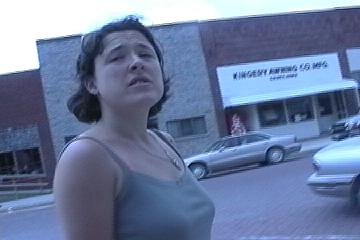
Gretchen in Casey, Iowa.

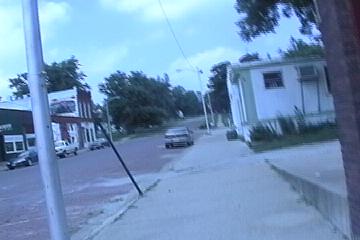
The main drag of Casey, Iowa.
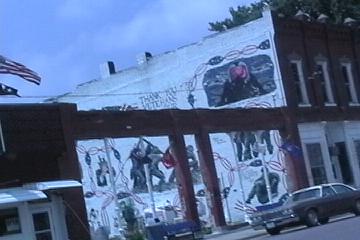
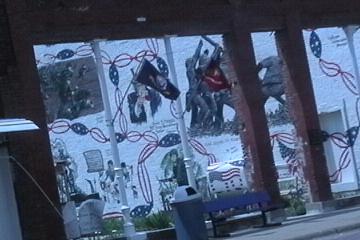
Casey heritage mural.
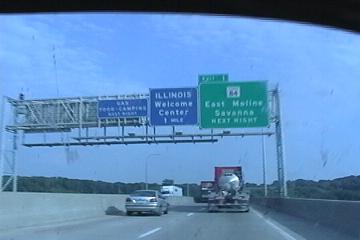
Bridge over the Mississippi.
For linking purposes this article's URL is:
http://asecular.com/blog.php?010716 feedback
previous | next |





